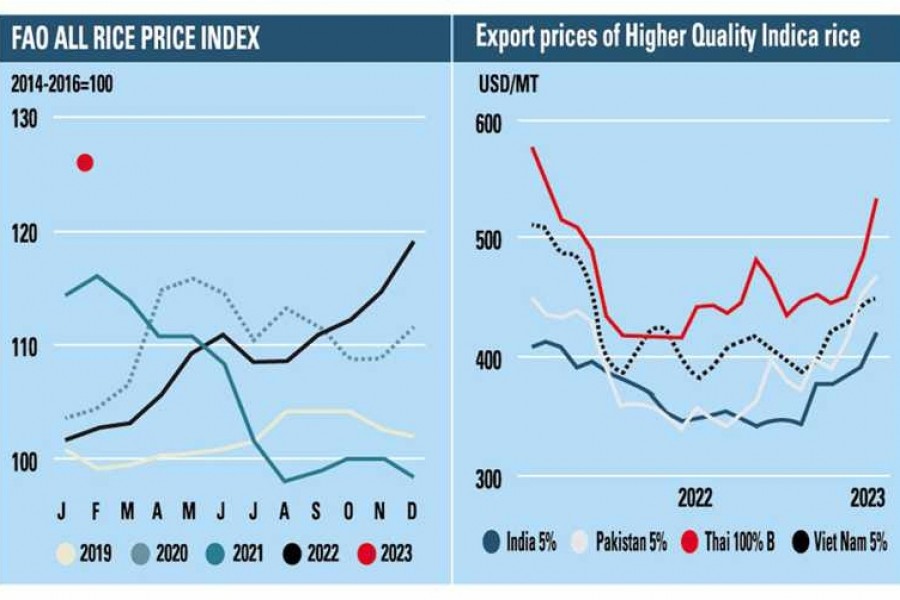The world rice prices hit a 12-year high in January 2023, raising further concern for the importing countries, according to a latest report of the Food and Agriculture Organisation of the UN (FAO).
Bangladesh's private sector imports have also almost stopped notably in recent weeks, indicating a gloomy prospect for the domestic rice market in coming months following the persisting volatile situation in the global commodity market, said market experts.
FAO All Rice Price Index increased to 126.4 points in January which is 6.2 per cent higher than that of December 2022 and a 12-year high, according to the FAO monthly report on the food grain, published on Friday.
The prices of Indica species, consumed mostly by South Asians, witnessed the highest surge as its index reached 127 points in January, uppermost level since 2011, said the FAO report.
Price of exportable parboiled rice of India reached $388-$ 419 a tonne while Pakistani and Vietnamese rice traded at $430 to $ 466 a tonne.
Thai parboiled rice, suitable for the South Asians, was traded at $ 473 to $ 523 a tonne in January. (FAO report documents FOB prices, freight charges are excluded here).
Gradual appreciation of Asian currencies against US dollar, rising demands in Indonesia, lesser exports by Pakistan amid a flood-induced low output, the lunar year celebration across the far-east Asia and a record pace of government domestic procurement by India despite a decline in output were some major reasons behind such tectonic hike in rice prices, said the FAO report.
Meanwhile, import by Bangladeshi traders almost stopped in recent weeks amid the rocketing global prices as well as obstacle to sourcing US dollar for opening L/Cs, Shamsul Hoque, a Rangpur-based importer, said.
He said cost for imported Indian coarse rice would be minimum Tk 57 a kg now considering the minimum price of $390 a tonne, duties of 15.2 per cent and freight charges.
Most of the importers are trying to bring medium varieties of rice like Ratna, BRRI dhan 28, Swarna-5 and finer quality like Nazersail, Miniket from West Bengal, Hariana and Punjab in India to make some profits.
A food ministry official told the FE that private sector has been permitted to bring 1.45 million tonnes of rice from the foreign sources this financial year but they could bring only 0.409 million tonnes so far.
He said the government has brought above 0.45 million tonnes of rice so far this FY while another 0.5 million tonnes would be imported (by the government).
He said the public warehouses have now a handsome amount of 1.95 million tonnes of food grains of which rice is 1.6 million tonnes; Aman rice procurement is also going on.
There will be no shortage of rice until the next Boro harvest, he added.
Economist and value chain expert Prof Dr Md Moniruzzaman said though coarse rice prices showed a slight decline in recent weeks, medium and finer rice prices have surged even during the Aman harvesting season.
There is no sign of relief as production cost in the ongoing Boro season has also been rising to a record high this year.
Rising import costs will be a matter of concern from the later days of March when the stock of Aman crop would start to decrease, he continued.
The government would have the preparation for those off-peak months, he said.
According to the Trading Corporation of Bangladesh (TCB) and the city groceries, coarse rice prices are static at Tk48-52 a kg but medium and finer varieties of rice witnessed a further Tk2.0-3.0 hike per kg in a month in Dhaka city as those were retailing at Tk62-68 and Tk 75-98 a kg respectively.
The current prices are 6.0-12 per cent higher than that a year ago.


